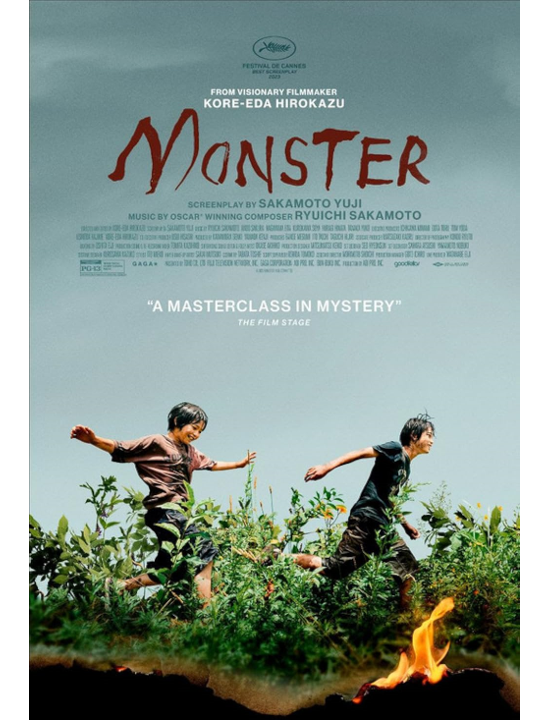




| Director | Hirokazu Kore-eda |
|---|---|
| Country | Japan |
| Year | 2023 |
Monster, directed by Hirokazu Kore-eda and written by Yuji Sakamoto, premiered at the 2023 Cannes Film Festival—where it earned the Queer Palm and Best Screenplay awards. This is the first feature Kore-eda directed without writing it himself since Maborosi (1995), marking a significant collaboration with Sakamoto and one of the late Ryuichi Sakamoto’s final musical scores. With a runtime of 125 minutes, the film is a psychological coming-of-age mystery unfurling in three distinct perspectives, each redrawing our understanding of what truth is.
The story opens with a dramatic fire in a lakeside Japanese town—but it’s the human embers that Kore-eda investigates. Saori (Sakura Ando), a single mother, becomes convinced her son Minato (Soya Kurokawa) has been abused by his teacher, Mr Hori (Eita Nagayama), based on troubling behaviour and rumours.
Kore-eda structures the film like a visual Rashomon: first from Saori’s anguished viewpoint, then from Hori’s defensive perspective, and eventually through Minato’s own. Each viewpoint reframes the narrative—what seemed clear starts to blur, and what felt malicious gains shades of misunderstanding.
The emotional heart lies in Minato’s tender yet uneasy friendship with his classmate Yori (Hinata Hiiragi), an outsider under threat. In the final segment, the film reveals the true complexity of the boys’ inner worlds and offers a deeply moving, imaginative release.
Sakura Ando as Saori radiates maternal desperation and quiet dignity, holding the film’s emotional core as she fights for her son—her performance both grounded and scathing. Eita Nagayama’s Hori is crisply drawn: defensive, flawed, ultimately human—a reminder that real characters resist simple moral binaries.
Child actors Soya Kurokawa (Minato) and Hinata Hiiragi (Yori) deliver nuanced, affecting portrayals. Their friendship, unfolding amid suspicion and sorrow, is a testament to Kore-eda’s gift for capturing childhood’s muted traumas and brave tenderness.
Monster dissects how quickly we label others 'monsters'—outsiders, children, teachers, parents—often without understanding. Through its three-part structure, the film dismantles assumptions, demanding empathy and patience. It explores bullying, grief, institutional coldness, and the silent worlds of children, places where adult logic fails to reach.
The film is unafraid to be ambiguous. It reserves judgment and invites viewers instead to hold discomfort, to inhabit the messy overlap of childhood innocence and adult failures.
Kore-eda arranges scenes as layers—repeated events shown from shifting angles. The opening fire, initially sensational, becomes charged with different emotional weights as perspectives shift.
Visually subtle and unflashy, the film’s cinematography evokes small-town unease and childhood isolation. The pacing requires patience, yet in its final act—a quiet, heartbreaking affirmation of understanding—the film becomes transcendent.
Ryuichi Sakamoto’s sparse piano-led score lingers beneath the narrative, weaving melancholy and wonder—an elegiac companion to the film’s fragile truths.
In emphasizing empathy over certainty, Monster challenges viewers to reconsider how quickly we interpret children’s behaviour, how institutions respond, and how prejudice fractures understanding. It is especially timely in conversations about mental health, bullying, and the need to listen to children’s voices—however confused or provocative they may appear.
Critics have largely celebrated Monster as one of Kore-eda’s most ambitious films. The Guardian praised its moral intelligence and emotional labyrinths, noting how its repeated motifs deepen rather than resolve questions. The New Yorker called its third act a “mini-masterwork,” rich with emotional immediacy and imaginative depth.
Empire described the film as tender, generous, and confirming Kore-eda’s mastery with child actors. Time Out awarded 4 stars, acknowledging its compositional ambition despite some narrative frustrations. Eye for Film noted the opening fire’s metaphorical power, emphasizing the film’s glimmers of hope amid tension.
Monster is an intricate, emotionally literate drama that unfolds like a fractal—expanding and deepening with every repeat. Kore-eda teaches us that truth is not linear, empathy is not easy, and children carry secrets we often fail to decode. It’s a film that stays with you—not because it resolves everything, but because it reminds us how little we truly see.
In an effort to reduce our paper usage, we stopped offering printed copies of our popular Film Notes at our screenings.
Instead, we are encouraging our members to read the Film Notes online. For those who wish to do so, it is still possible to print these pages prior to the film.
Alternatively, if you want to read the notes just before or just after the film, and also minimise your paper consumption, then you can scan the QR code to your phone and then download the webpage.
